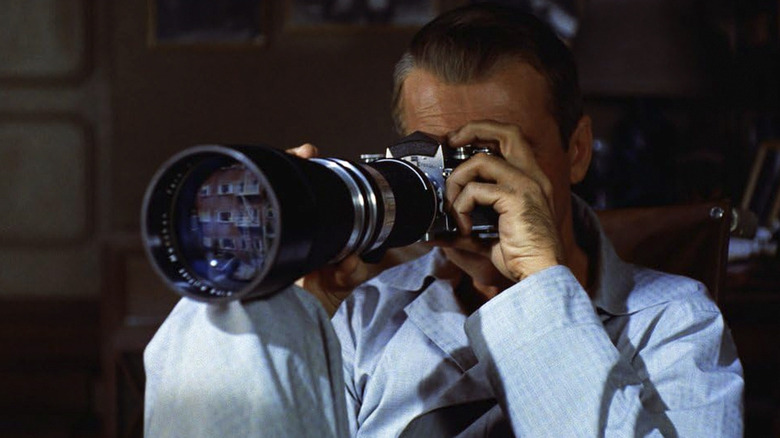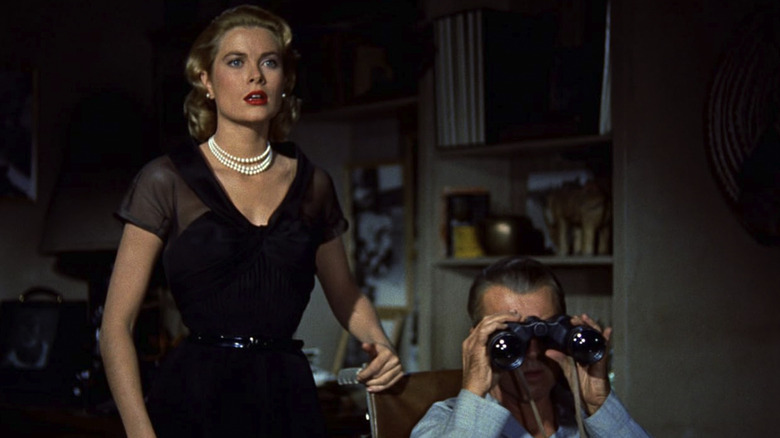Alfred Hitchcock’s “Rear Window” celebrates its 71st anniversary later this yr, however rewatching it in March 2025, the film performs in a different way than it ever has earlier than.
In case you’ve by no means seen it, otherwise you want a refresher on the plot, the movie stars James Stewart as a photographer who’s damaged his leg and is confined to his New York Metropolis residence whereas he recovers. Bored out of his thoughts after having been there for weeks, he begins searching his window and spying on his neighbors, solely to note some one among them take part in some … suspicious exercise, and he turns into obsessive about determining what’s actually occurring.
Watching the movie once more this week, I used to be struck by what number of similarities there are to what we’re experiencing now. The fashionable equal of staring out the window at our neighbors appears to be wanting into our telephones, which give us a window to a a lot wider world, and I believe a variety of us really feel like we’re Stewart’s character, unable to really do very a lot regardless of witnessing atrocities of various levels virtually each day. Whether or not it is bombs nonetheless being dropped on Gaza throughout a supposed ceasefire or watching Donald Trump and Elon Musk flout the principles and basically dismantle the Structure earlier than our very eyes, there is a brazenness to those world occasions that jogs my memory of Lars Thorwald (Raymond Burr), the grim neighbor who barely bothers to disguise the crime he is dedicated. There’s a conceit to the character and to those modern-day figures — an expectation that there’ll by no means be any unfavorable penalties for something they do.
Rear Window nonetheless feels related in 2025
There are two particularly terrifying moments within the film. One is when Stewart is watching Grace Kelly’s character break into Thorwald’s residence to get proof that Thorwald has killed his spouse, and Thorwald unexpectedly comes residence and begins assaulting her. Stewart gasps and fidgets as he watches from afar, however he is in a leg forged and briefly caught in a wheelchair — there’s nothing he can do to save lots of her.
The opposite terrifying second comes in the course of the ending of “Rear Window,” when Thorwald comes into Stewart’s residence and assaults him. Stewart is ready to put up a little bit of a struggle through the use of the flashbulbs on his digital camera to briefly blind his attacker, however shining a light-weight on this villain is not sufficient to cease him — he costs ahead and finally hurls Stewart out of a window. Fortunately, within the film, the police are there to interrupt Stewart’s fall and arrest the unhealthy man. However contemplating that this nation’s social security web is a part of what’s being actively eroded, and there are not any authorized penalties for warfare crimes or inciting or collaborating in an rebel, it seems like we can’t be as fortunate when our villains immediately come for us.
Author John Michael Hayes, adapting a brief story by Cornell Woolrich and impressed by a number of real-life murders, tapped into one thing with this story — one thing common that is managed to carry up via McCarthyism, the Chilly Conflict, and any variety of different metaphors audiences have utilized to it over the previous seven a long time. (I had fully forgotten till simply this minute that I’ve beforehand written about it as a metaphor for quarantined life in the course of the earliest days of the pandemic.) Hitchcock, one of the crucial well-known administrators the world has ever seen, might be finest identified for “Pyscho,” “Vertigo,” and a number of other of his “unsuitable man” classics, however “Rear Window” simply could be essentially the most timeless movie of his unbelievable profession.
I spoke a little bit concerning the movie on at this time’s episode of the /Movie Day by day podcast, which you’ll hearken to under:
You possibly can subscribe to /Movie Day by day on Apple Podcasts, Overcast, Spotify, or wherever you get your podcasts, and ship your suggestions, questions, feedback, considerations, and mailbag subjects to us at bpearson@slashfilm.com. Please go away your title and common geographic location in case we point out your e-mail on the air.



